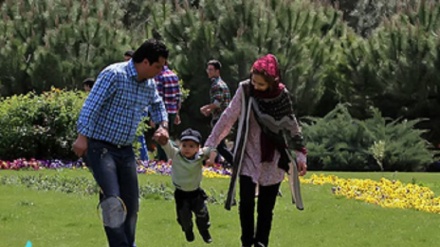Iranian Family (43)
God, upon the marriage of Adam and Eve, invited all human beings toward marriage, and depicted human perfection in the cooperation and emotional bond among couples within the framework of marriage.
The divine prudence has been displayed in the mutual attraction between men and women, leading mankind to establish families throughout the course of history, thereby enabling mankind to continue his existence. We have on several occasions pointed out that Holy Quran underlines that formation of family results in peace of mind, and this heavenly tranquility is one of the signs and manifestations of the power and grandeur of the one and only creator of the world, God Almighty. In fact, a man and a woman who initially have no emotional and/or spiritual attachment toward each other, form an emotional bond upon marriage, and in the light of this emotional bond, sense peace of mind and spiritual tranquility.
God has attached significant importance to marriage.
Unfortunately, the contemporary world hugely disregards this important principle and suffers from the absence of tranquility. Anxiety, mental disorders and complexes are widespread; the root cause of which is the blow dealt against the foundation of family. The crisis of the foundations of family in the West, and its replacement by singlehood has generated major concerns among the Western thinkers; making them realize that the only way out of this catastrophe is to re-embrace the foundations of family.
Based on a body of studies which have been carried out in Southeast Asian countries; children learn ten behavioral patterns from their father and two behavioral patterns from their mother. Maintenance of self-confidence and piety are two behavioral patterns which children acquire respectively from their father and mother. The child acquires 61% of his self-confidence from his father and 64.5% of his piety from his mother.
Meanwhile, elder siblings also play a significant role in the child's upbringing; with some of the characteristic traits of elder siblings influencing and impacting the child. Hence, the upbringing of children and parents' success in this task is highly important.
Last week, we partly spoke of the features of parents who are hard on their children or are easygoing. Meanwhile, some families suffer from a widening rift among their members. In such families, parents disagree and argue with each other, which in turn leaves a negative impact on their children.
Children of such parents may take sides in their parents' arguments, or may fall victim and suffer the consequences of erupting disputes among their parents. The physical and psychological needs of children who grow up in such families are unmet; which in turn leads to children's aggressive behavior.
The members of such families usually look depressed and emotionally numb. In such families, the demands of family members from each other fall on deaf ears. Children in these families are often in despair, showing signs of anti-social behavior, and criminal activities. Those, who suffer from mental disorders, drug abuse, and self-alienation have mainly grown up in dysfunctional families.
In the meantime, in healthy families, children are relatively controlled and restricted by their parents, while concurrently children are also encouraged to accomplish independence and freedom of mind. In these families, parents and their children highly value their mutual communications, and are not emotionally distant.
In these families, members are honest and are keen to converse with each other, and to listen to each other's remarks.
It should be noted that respecting children helps the development of self-confidence in them and enables them to attain healthy characteristic traits, which in turn leads to popularity of children among their peers, and children's self-actualization.
It should also be reminded that maintenance of happiness is one of the vital needs of family members.
MR/ME


